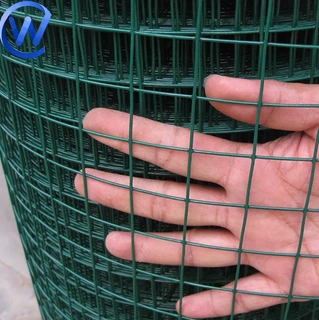-
+86 15030157877
-
sales@galvanizedmetalmesh.com
Sep . 02, 2025 09:33 Kembali ke daftar
Wire Mesh in Hydroponic Farming Systems
Hydroponic farming systems have revolutionized modern agriculture by enabling soil-free cultivation in controlled environments. A critical component in these systems is wire mesh, which provides essential structural support and functionality. This article explores the versatility of wire mesh, welded wire mesh, and woven wire mesh in hydroponic applications, highlighting their benefits, specifications, and common uses.

The Role of Wire Mesh in Hydroponic Structures
Wire mesh serves as the backbone of many hydroponic systems, offering a stable framework for plant growth. Its grid-like structure allows roots to penetrate while supporting the weight of plants and growing media. Whether used in vertical towers, troughs, or floating rafts, wire mesh ensures proper aeration and drainage, preventing waterlogging and root rot. The mesh size, typically ranging from 1/2" x 1/2" to 2" x 2", is carefully selected based on the crop type and system requirements. For delicate seedlings, finer meshes provide gentle support, while larger sizes accommodate mature plants with robust root systems.
Welded Wire Mesh: Strength and Precision for Hydroponic Applications
Jaring kawat yang dilas is renowned for its durability and uniform grid pattern, making it ideal for heavy-duty hydroponic structures. Manufactured by welding intersecting wires at each junction, this type of mesh offers exceptional strength and resistance to deformation. In hydroponic systems, welded wire mesh is commonly used in:
- Plant Support Structures: Vertical frames and trellises that hold climbing plants like tomatoes or cucumbers.
- Nutrient Film Technique (NFT) Channels: Reinforced channels that guide nutrient-rich water to plant roots.
- Floating Raft Systems: Submerged platforms that support plants in deep water culture.
Available in various surface treatments—including electro galvanized, hot dipped galvanized, and PVC coated—welded wire mesh provides long-lasting corrosion resistance, even in humid or chemically treated environments.
Woven Wire Mesh: Flexibility and Adaptability for Hydroponic Innovation
Woven wire mesh offers a flexible alternative to welded options, with interlaced wires creating a pliable yet sturdy material. This type of mesh is particularly useful in hydroponic systems that require custom shapes or curved surfaces. Key applications include:
- Curved Growing Chambers: Conforming to unique architectural designs in urban or vertical farms.
- Filtering Systems: Separating solid particles from nutrient solutions in recirculating systems.
- Seedling Trays: Providing a breathable base for young plants to develop strong roots.
The flexibility of woven wire mesh also simplifies installation and reduces material waste, making it a cost-effective choice for large-scale hydroponic operations.
Product Specifications
Wire Mesh Specifications
|
Parameter |
Options |
|
Ukuran Jala |
1/2" x 1/2", 3/4" x 3/4", 1" x 1", 2" x 2", 1" x 2" |
|
Pengobatan permukaan |
Electro galvanized, hot dipped galvanized, PVC coated |
|
Lebar |
0,9m, 1,2m |
|
Panjang |
10m, 15m, 20m, 23m, 25m, 28m, 30m, 50m |
|
Roll Weight |
5kg, 6,5kg, 7kg, 7,5kg, 8kg, 9kg, 11kg, 18kg, dll. |
|
Hot Selling Sizes |
0.6m x 10m, 0.9m x 10m, 0.9m x 25m, 0.9m x 28m, 0.9m x 30m, 0.9m x 23m, 1.2m x 30m, 1.2m x 10m |
FAQs About Wire Mesh for Hydroponic Farming
What are the advantages of using welded wire mesh in hydroponic systems?
Jaring kawat yang dilas offers superior strength and structural integrity, ensuring long-term durability in wet environments. Its precise grid pattern provides consistent support for plants, while galvanized or PVC-coated finishes prevent rust and chemical corrosion, extending the lifespan of hydroponic structures.
How does woven wire mesh differ from welded wire mesh in hydroponic applications?
Woven wire mesh is more flexible and adaptable, making it suitable for custom-shaped hydroponic components. Its interlaced design allows for slight movement without compromising stability, ideal for applications requiring vibration resistance or curved surfaces.
What surface treatment is best for wire mesh in hydroponic systems?
Hot dipped galvanized wire mesh provides the highest corrosion resistance, making it ideal for long-term use in nutrient-rich water. PVC-coated mesh offers additional protection against harsh chemicals and UV exposure, extending the mesh’s lifespan in outdoor or greenhouse settings.
Can wire mesh be customized for specific hydroponic system requirements?
Yes, wire mesh can be tailored to meet exact specifications, including custom mesh sizes, widths, lengths, and surface treatments. This flexibility ensures seamless integration with any hydroponic system design, from small-scale vertical farms to large commercial operations.
What are the typical applications of wire mesh in hydroponic farming? --H3
Wire mesh is used in various hydroponic applications, including plant support structures, growing platforms, nutrient solution filtration systems, and protective barriers. Its versatility makes it an essential component for optimizing plant growth and system efficiency in any hydroponic setup.
With over 20 years of manufacturing and exporting experience, this wire mesh supplier is a trusted partner for hydroponic farming operations worldwide. Based in Anping County, Hebei Province, the company specializes in producing high-quality wire mesh, welded wire mesh, and woven wire mesh using advanced equipment and strict quality control systems. Their products are available in a wide range of specifications to meet diverse hydroponic needs, with competitive pricing and reliable logistics ensuring timely delivery to domestic and international markets. Committed to customer satisfaction, the supplier prioritizes reputation and quality, providing tailored solutions that help hydroponic farmers maximize productivity and profitability.
-
Stainless Steel Wire Mesh | 304/316, Factory Direct Prices
BeritaNov.17,2025
-
Stainless Steel Wire Mesh – Durable, Rust-Resistant, Exact
BeritaNov.17,2025
-
Expanded Metal Mesh: Custom, Durable, Factory-Direct Supply
BeritaNov.17,2025
-
Security Window Screen Mesh | Stainless Steel, Anti-Theft
BeritaNov.17,2025
-
Anti Bird Spikes Exporter – Durable Humane OEM Wholesale
BeritaNov.17,2025
-
Metal Mesh Fabric For Glass Laminated - UV-Stable, Custom
BeritaNov.11,2025



